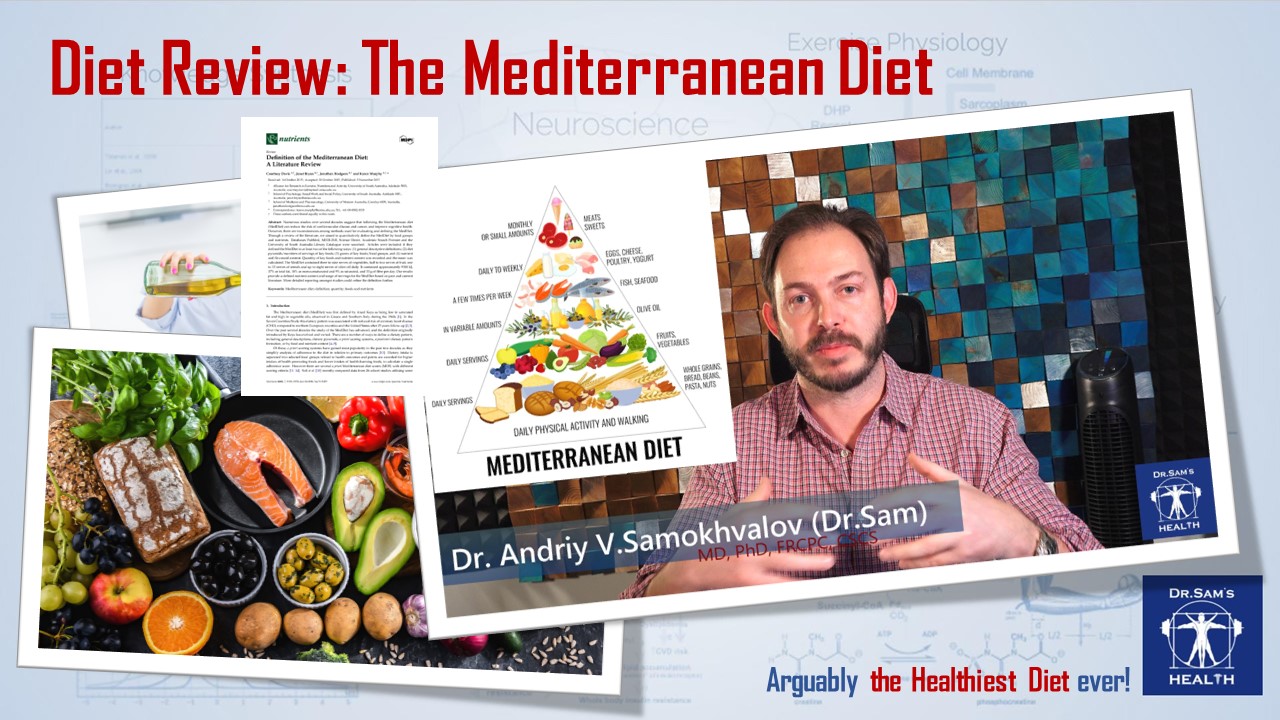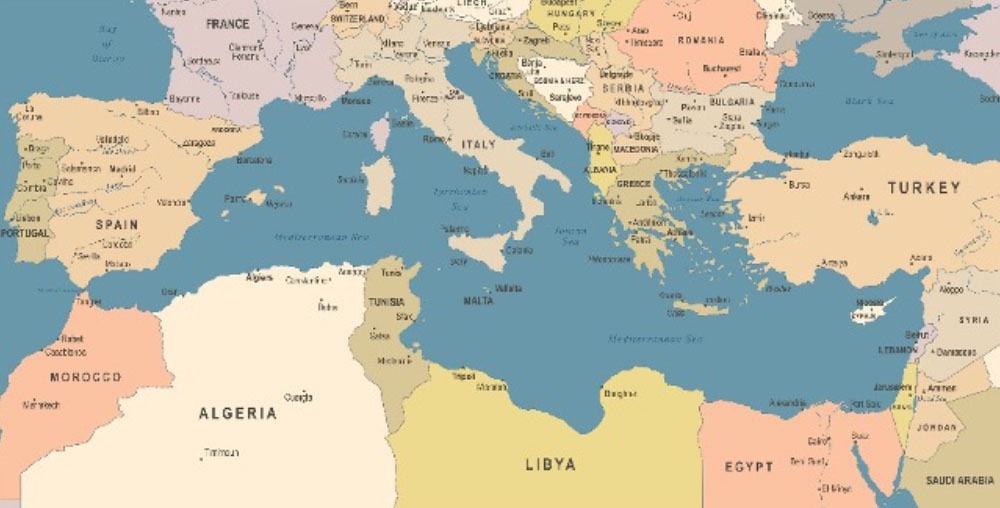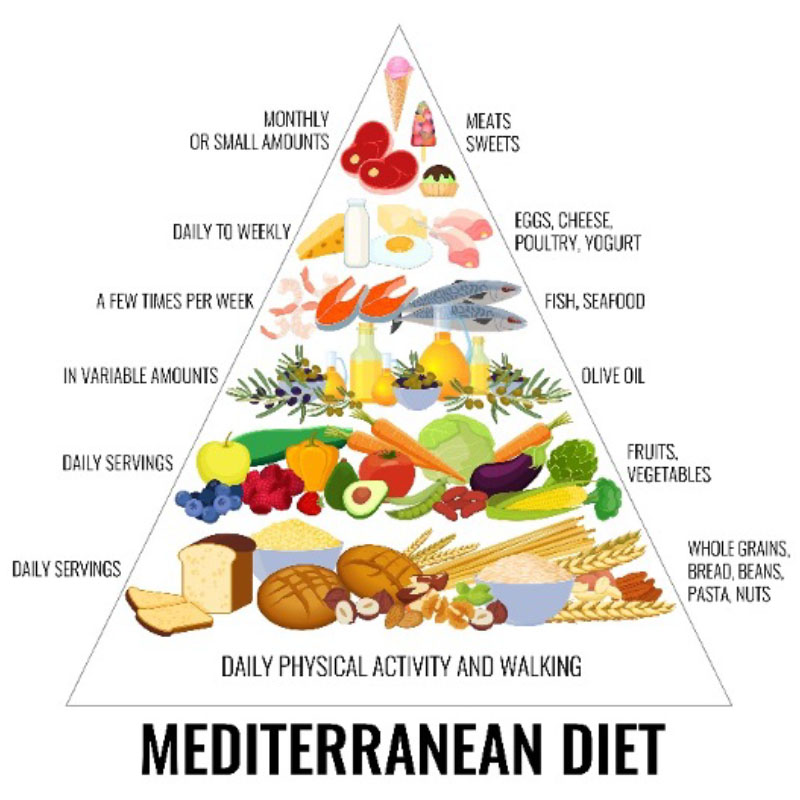
I continue working on reviewing various diets and today I would like to talk about one of the healthiest diets ever – the Mediterranean Diet. I don’t think I have ever met a person who would say that this diet is not healthy and would be against it. It is highly recommended by medical community as it is a literal embodiment of a “balanced” diet and is associated with longevity and improved health outcomes.
This diet is, quite frankly, not well defined as it is not a diet that was devised by some researchers or nutritionists – it is a diet that has emerged naturally in the Mediterranean region, hence the name, and its parameters vary from one place to another, which makes it hard to define. So, let’s start with that.

The definition
The Mediterranean diet incorporates cuisines of the Mediterranean region – countries like Spain, Italy, Greece, Portugal, France, and many others. Even at this point I am not sure which countries I should list here as the cuisine of some Mediterranean countries might deviate significantly from the Mediterranean nutrition style. And it’s even harder to describe what it is. Nevertheless, I will try as I have found a great review paper on it1, and it can provide us with some sort of a formal data on the diet’s composition. As a side note – it is important for researchers to operationalize the diet they use in their clinical research projects. Otherwise, it’s hard to investigate the impact of the Mediterranean Diet on health and longevity.
Based on some of the review studies we have1,2, the Mediterranean Diet may be described as the diet that is mostly plant-based as it is based on olive oil, vegetables and fruits, breads, cereals, legumes and nuts. It also includes decent amounts of fish and seafood and some eggs, poultry, red meat, dairy products as well as sweets and red wine in moderation. We can even have a classical nutritional “pyramid” outlining the composition of this wonderful diet2.

Energy and nutrient composition of the Mediterranean Diet
Based on the data from multiple sources, the average composition of the Mediterranean Diet is approximately 9.3 MJ/day or 2.2 kcal/day with 37% of energy coming from fat (19% from monounsaturated fat, 5% from polyunsaturated fat, 9% from saturated fat), 15% - from protein, and 43% of energy – from carbohydrates. There are some indications that on average this diet delivers around 1.1 g or 1.3% of energy from omega-3 fatty acids. In addition to that the diet is rich in polyphenols and multiple vitamins and minerals that strengthen our health.
There are numerous publications showing that the Mediterranean Diet is associated with better cardiovascular health, cognition and overall better health outcomes and reduced mortality (e.g. [3-5]). We will review that as well as its effects on weight loss and maintenance in Part II and Part III of this blog, respectively.
Summary
The Mediterranean Diet is a great, balanced diet, which is relatively hard to define as its composition varies significantly between the countries of the Mediterranean region. Nevertheless, we have reviewed the working operationalization of this diet and outlined its composition today. There are also multiple clear indications that this diet is “healthy”, and we will definitely talk about that in great detail in my next blog and in my videos. I also mention this diet in my book “The Rational Diet” as one of the greatest dietary approaches you can use to lose and maintain weight and health.
Sincerely Yours,
Dr.Sam
Video: Diet Review: The Mediterranean Diet (Introduction)
References
1. Davis C, Bryan J, Hodgson J, Murphy K: Definition of the Mediterranean Diet; A Literature Review. Nutrients 2015, 7(11):9139-9153.
2. Bach-Faig A, Berry EM, Lairon D, Reguant J, Trichopoulou A, Dernini S, Medina FX, Battino M, Belahsen R, Miranda G et al: Mediterranean diet pyramid today. Science and cultural updates. Public Health Nutrition 2011, 14(12A):2274-2284.
3. Guasch‐Ferré M, Willett WC: The Mediterranean diet and health: a comprehensive overview. Journal of Internal Medicine 2021, 290(3):549-566.
4. Trichopoulou A, Martínez-González MA, Tong TY, Forouhi NG, Khandelwal S, Prabhakaran D, Mozaffarian D, De Lorgeril M: Definitions and potential health benefits of the Mediterranean diet: views from experts around the world. BMC Medicine 2014, 12(1):112.
5. Ventriglio A, Sancassiani F, Contu MP, Latorre M, Di Slavatore M, Fornaro M, Bhugra D: Mediterranean Diet and its Benefits on Health and Mental Health: A Literature Review. Clinical Practice & Epidemiology in Mental Health 2020, 16(1):156-164.
